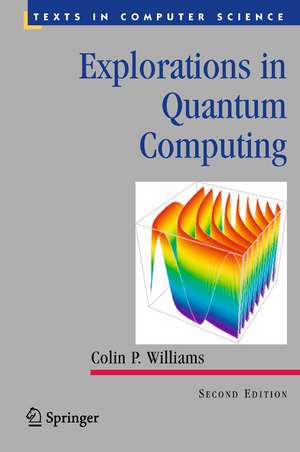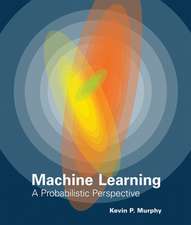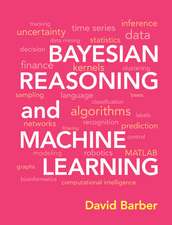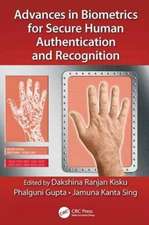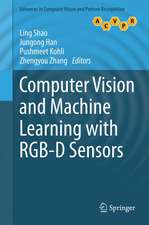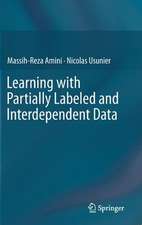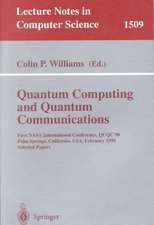Explorations in Quantum Computing: Texts in Computer Science
Autor Colin P. Williamsen Limba Engleză Hardback – 27 dec 2010
| Toate formatele și edițiile | Preț | Express |
|---|---|---|
| Paperback (1) | 426.79 lei 38-44 zile | |
| SPRINGER LONDON – 27 dec 2010 | 426.79 lei 38-44 zile | |
| Hardback (1) | 621.18 lei 6-8 săpt. | |
| SPRINGER LONDON – 27 dec 2010 | 621.18 lei 6-8 săpt. |
Din seria Texts in Computer Science
- 20%
 Preț: 406.21 lei
Preț: 406.21 lei - 20%
 Preț: 675.35 lei
Preț: 675.35 lei - 20%
 Preț: 370.59 lei
Preț: 370.59 lei - 20%
 Preț: 474.58 lei
Preț: 474.58 lei - 20%
 Preț: 306.35 lei
Preț: 306.35 lei - 20%
 Preț: 460.78 lei
Preț: 460.78 lei - 20%
 Preț: 1244.39 lei
Preț: 1244.39 lei - 20%
 Preț: 503.87 lei
Preț: 503.87 lei - 20%
 Preț: 379.63 lei
Preț: 379.63 lei - 20%
 Preț: 444.93 lei
Preț: 444.93 lei - 20%
 Preț: 411.75 lei
Preț: 411.75 lei - 20%
 Preț: 305.30 lei
Preț: 305.30 lei - 17%
 Preț: 366.69 lei
Preț: 366.69 lei - 20%
 Preț: 409.70 lei
Preț: 409.70 lei - 20%
 Preț: 370.22 lei
Preț: 370.22 lei - 20%
 Preț: 411.53 lei
Preț: 411.53 lei - 20%
 Preț: 441.70 lei
Preț: 441.70 lei - 20%
 Preț: 423.52 lei
Preț: 423.52 lei - 20%
 Preț: 515.34 lei
Preț: 515.34 lei - 15%
 Preț: 637.58 lei
Preț: 637.58 lei - 20%
 Preț: 353.33 lei
Preț: 353.33 lei - 20%
 Preț: 356.82 lei
Preț: 356.82 lei - 20%
 Preț: 743.62 lei
Preț: 743.62 lei - 20%
 Preț: 663.45 lei
Preț: 663.45 lei - 20%
 Preț: 536.66 lei
Preț: 536.66 lei -
 Preț: 457.75 lei
Preț: 457.75 lei - 20%
 Preț: 181.92 lei
Preț: 181.92 lei - 20%
 Preț: 330.42 lei
Preț: 330.42 lei - 20%
 Preț: 358.24 lei
Preț: 358.24 lei -
 Preț: 385.84 lei
Preț: 385.84 lei - 20%
 Preț: 394.57 lei
Preț: 394.57 lei - 20%
 Preț: 344.76 lei
Preț: 344.76 lei - 20%
 Preț: 350.86 lei
Preț: 350.86 lei - 20%
 Preț: 348.89 lei
Preț: 348.89 lei - 20%
 Preț: 339.95 lei
Preț: 339.95 lei - 20%
 Preț: 588.21 lei
Preț: 588.21 lei - 20%
 Preț: 199.57 lei
Preț: 199.57 lei - 20%
 Preț: 341.30 lei
Preț: 341.30 lei - 23%
 Preț: 726.93 lei
Preț: 726.93 lei - 20%
 Preț: 325.30 lei
Preț: 325.30 lei - 20%
 Preț: 595.80 lei
Preț: 595.80 lei - 20%
 Preț: 593.48 lei
Preț: 593.48 lei -
 Preț: 454.30 lei
Preț: 454.30 lei
Preț: 621.18 lei
Preț vechi: 776.48 lei
-20% Nou
Puncte Express: 932
Preț estimativ în valută:
118.86€ • 124.43$ • 98.35£
118.86€ • 124.43$ • 98.35£
Carte tipărită la comandă
Livrare economică 05-19 aprilie
Preluare comenzi: 021 569.72.76
Specificații
ISBN-13: 9781846288869
ISBN-10: 184628886X
Pagini: 739
Ilustrații: XXII, 717 p.
Greutate: 1.32 kg
Ediția:2nd ed. 2011
Editura: SPRINGER LONDON
Colecția Springer
Seria Texts in Computer Science
Locul publicării:London, United Kingdom
ISBN-10: 184628886X
Pagini: 739
Ilustrații: XXII, 717 p.
Greutate: 1.32 kg
Ediția:2nd ed. 2011
Editura: SPRINGER LONDON
Colecția Springer
Seria Texts in Computer Science
Locul publicării:London, United Kingdom
Public țintă
Professional/practitionerCuprins
Part I: What Is Quantum Computing.- Introduction.- Quantum Gates.- Quantum Circuits.- Quantum Universality, Computability, & Complexity.- Part II: What Can You Do With A Quantum Computer?- Performing Search With A Quantum Computer.- Code Breaking With A Quantum Computer.- Solving NP-Complete Problems With A Quantum Computer.- Quantum Simulation With A Quantum Computer.- Quantum Chemistry With A Quantum Computer.- Mathematics On A Quantum Computer.- Part III: What Can You Do With Quantum Information?- Quantum Information.- Quantum Teleportation.- Quantum Cryptography.- Part IV: Towards Practical Quantum Computers.- Quantum Error Correction.- Alternative Models Of Quantum Computation.
Recenzii
From the reviews of the second edition:
“This book suggests that as computers decrease in scale, we should take a closer look at the relationship between the physical world in which computers live, and the theoretical aspects of what and how they compute. … This book is intended for graduate-level computer science students. … The book includes exercises at the end of each chapter. … The bibliography is extensive, demonstrating that the field has matured somewhat over time.” (William Fahle, ACM Computing Reviews, August, 2011)
“It is a truly impressive object, clearly a labor of love, and I learned a great deal in reading it. … I enjoyed reading this book. … Explorations in quantum computing is a good and useful entry in the growing pedagogical literature on quantum information. It is not the most tightly focused book, but it is full-to-bursting with interesting facts and discussions. The book is well written and interesting, and experts as well as newcomers to the field will enjoy dipping into it.” (Todd A. Brun, Mathematical Reviews, February, 2013)
“This book suggests that as computers decrease in scale, we should take a closer look at the relationship between the physical world in which computers live, and the theoretical aspects of what and how they compute. … This book is intended for graduate-level computer science students. … The book includes exercises at the end of each chapter. … The bibliography is extensive, demonstrating that the field has matured somewhat over time.” (William Fahle, ACM Computing Reviews, August, 2011)
“It is a truly impressive object, clearly a labor of love, and I learned a great deal in reading it. … I enjoyed reading this book. … Explorations in quantum computing is a good and useful entry in the growing pedagogical literature on quantum information. It is not the most tightly focused book, but it is full-to-bursting with interesting facts and discussions. The book is well written and interesting, and experts as well as newcomers to the field will enjoy dipping into it.” (Todd A. Brun, Mathematical Reviews, February, 2013)
Textul de pe ultima copertă
By the year 2020, the basic memory components of a computer will be the size of individual atoms. At such scales, the current theory of computation will become invalid.
“Quantum computing” is reinventing the foundations of computer science and information theory in a way that is consistent with quantum physics – the most accurate model of reality currently known. Remarkably, this theory predicts that quantum computers can perform certain tasks exponentially faster than classical computers and, better yet, can accomplish “impossible” feats such as teleporting information, breaking supposedly “unbreakable” codes, generating true random numbers, and communicating with messages that betray the presence of eavesdropping.
This widely anticipated second edition of Explorations in Quantum Computing explains the field from a fresh perspective, emphasizing lesser known quantum transforms, and practical applications of quantum algorithms and quantum information theory. The required mathematical machinery is developed systematically, and the students’ knowledge tested through several end-of-chapter exercises. This easy-to-read, time-tested, and comprehensive textbook provides a unique perspective on the capabilities of quantum computers, and supplies readers with the tools necessary to make their own foray into this exciting field.
Topics and features:
Describes uses of quantum information, including quantum teleportation, superdense coding, quantum data compression, quantum cloning, quantum negation, and quantum cryptography Reviews the advancements made towards practical quantum computers covering developments in quantum error correction, quantum error avoidance, and alternative models of quantum computation This text/reference is ideal for anyone wishing to learn more about this incredible, perhaps “ultimate,” computer revolution.
Dr. Colin P. Williams is Program Manager for Advanced Computing Paradigms at the NASA Jet Propulsion Laboratory, California Institute of Technology, and formerly acting Associate Professor of Computer Science at Stanford University where he taught courses on quantum computing and quantum information theory, and computer-algebra systems. He has spent over a decade working in quantum computing, and inspiring and leading high technology teams. Today his interests include quantum computing, artificial intelligence, cognitive computing, evolutionary computing, computational material design, computer visualization, and computationally-enabled remote olfaction. He was formerly a Research Scientist at Xerox PARC and a Research Assistant to Prof. Stephen W. Hawking at Cambridge University.
“Quantum computing” is reinventing the foundations of computer science and information theory in a way that is consistent with quantum physics – the most accurate model of reality currently known. Remarkably, this theory predicts that quantum computers can perform certain tasks exponentially faster than classical computers and, better yet, can accomplish “impossible” feats such as teleporting information, breaking supposedly “unbreakable” codes, generating true random numbers, and communicating with messages that betray the presence of eavesdropping.
This widely anticipated second edition of Explorations in Quantum Computing explains the field from a fresh perspective, emphasizing lesser known quantum transforms, and practical applications of quantum algorithms and quantum information theory. The required mathematical machinery is developed systematically, and the students’ knowledge tested through several end-of-chapter exercises. This easy-to-read, time-tested, and comprehensive textbook provides a unique perspective on the capabilities of quantum computers, and supplies readers with the tools necessary to make their own foray into this exciting field.
Topics and features:
- Concludes each chapter with exercises and a summary of the material covered
- Provides an introduction to the mathematical formalism of quantum computing, and the quantum effects that can be harnessed to achieve unparalleled new capabilities
- Discusses the concepts of quantum gates, entangling power, quantum circuits, quantum Fourier, wavelet, and cosine transforms, quantum universality, quantum computability, and quantum complexity
- Examines the potential applications of quantum computers in areas such as search, code-breaking, solving
Dr. Colin P. Williams is Program Manager for Advanced Computing Paradigms at the NASA Jet Propulsion Laboratory, California Institute of Technology, and formerly acting Associate Professor of Computer Science at Stanford University where he taught courses on quantum computing and quantum information theory, and computer-algebra systems. He has spent over a decade working in quantum computing, and inspiring and leading high technology teams. Today his interests include quantum computing, artificial intelligence, cognitive computing, evolutionary computing, computational material design, computer visualization, and computationally-enabled remote olfaction. He was formerly a Research Scientist at Xerox PARC and a Research Assistant to Prof. Stephen W. Hawking at Cambridge University.
Caracteristici
Provides an introduction to the basic mathematical formalism of quantum computing, and the quantum effects that can be harnessed for non-classical computation Concludes each chapter with exercises and a summary of the material covered Examines the potential applications of quantum computers, investigates the uses of quantum information, and reviews the advancements made towards practical quantum computers Includes supplementary material: sn.pub/extras
